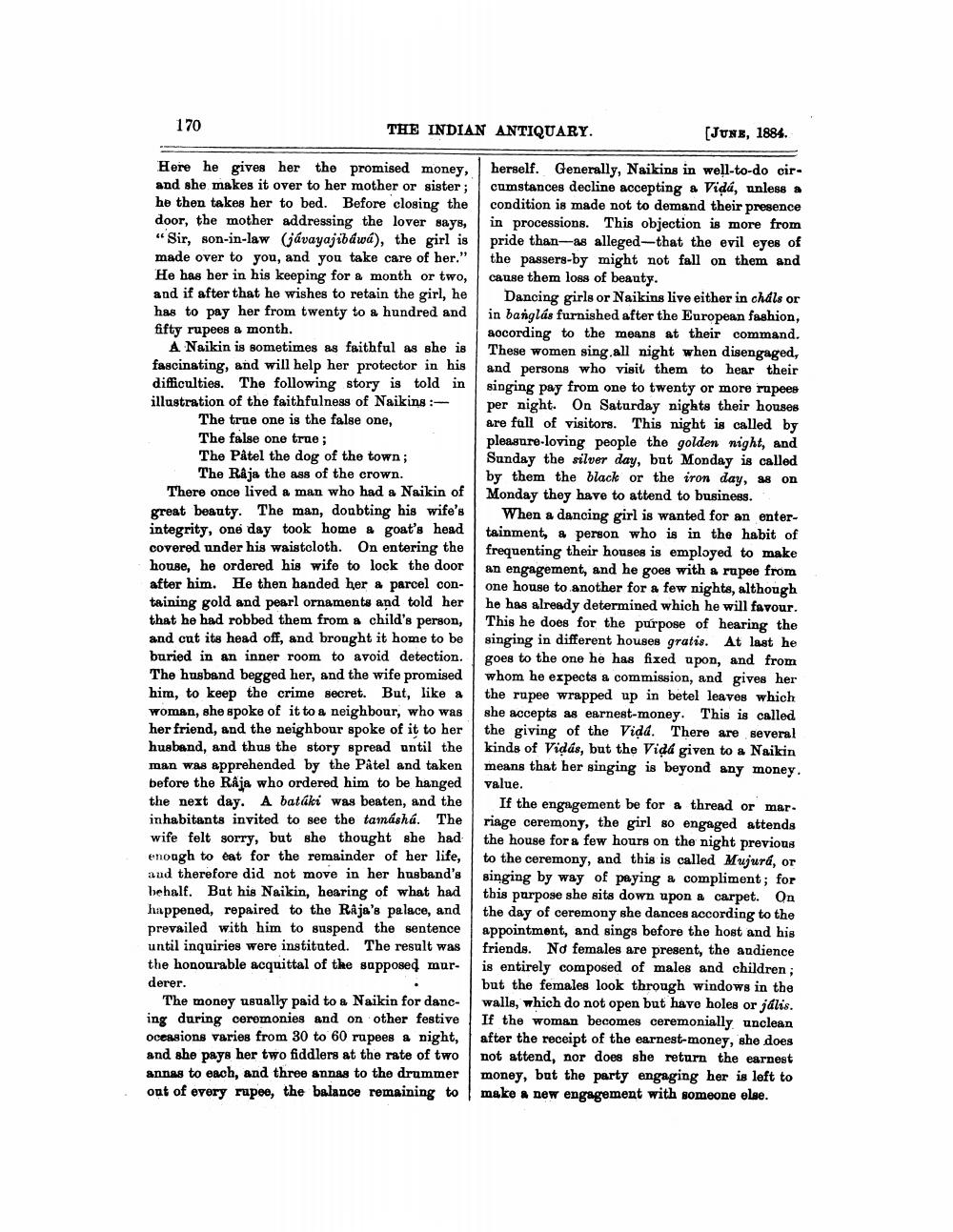________________
170
THE INDIAN ANTIQUARY.
[JUNE, 1884.
Here he gives her the promised money, and she makes it over to her mother or sister; he then takes her to bed. Before closing the door, the mother addressing the lover says, “Sir, son-in-law (jávayajibáwá), the girl is made over to you, and you take care of her." He has her in his keeping for a month or two, and if after that he wishes to retain the girl, he has to pay her from twenty to a hundred and fifty rupees a month.
A Naikin is sometimes as faithful as she is fascinating, and will help her protector in his difficulties. The following story is told in illustration of the faithfulness of Naikins :
The true one is the false one, The false one true; The Pâtel the dog of the town;
The Raja the ass of the crown. There once lived a man who had a Naikin of great beauty. The man, doubting his wife's integrity, one day took home a goat's head covered under his waistcloth. On entering the house, he ordered his wife to lock the door after him. He then handed her a parcel containing gold and pearl ornaments and told her that he had robbed them from a child's person, and cut its head off, and brought it home to be buried in an inner room to avoid detection. The husband begged her, and the wife promised him, to keep the crime secret. But, like a woman, she spoke of it to a neighbour, who was her friend, and the neighbour spoke of it to her husband, and thus the story spread until the man was apprehended by the Patel and taken before the Raja who ordered him to be hanged the next day. A batáki was beaten, and the inhabitants invited to see the tamáshá. The wife felt sorry, but she thought she had enough to eat for the remainder of her life, and therefore did not move in her husband's behalf. But his Naikin, hearing of what had happened, repaired to the Raja's palace, and prevailed with him to suspend the sentence until inquiries were instituted. The result was the honourable acquittal of the supposed mur. derer.
The money usually paid to a Naikin for dancing during ceremonies and on other festive ocensions varies from 30 to 60 rupees a night, and she pays her two fiddlers at the rate of two annas to each, and three annas to the drummer out of every rapee, the balance remaining to
herself. Generally, Naikins in well-to-do circumstances decline accepting a Vida, unless a condition is made not to demand their presence in processions. This objection is more from pride than-as alleged-that the evil eyes of the passers-by might not fall on them and cause them loss of beauty.
Dancing girls or Naikins live either in cháls or in banglás furnished after the European fashion, according to the means at their command. These women sing all night when disengaged, and persons who visit them to hear their singing pay from one to twenty or more rupees per night. On Saturday nights their houses are full of visitors. This night is called by pleasure-loving people the golden night, and Sunday the silver day, but Monday is called by them the black or the iron day, 18 on Monday they have to attend to business.
When a dancing girl is wanted for an entertainment, & person who is in the habit of frequenting their houses is employed to make an engagement, and he goes with a rupee from one house to another for a few nights, although he has already determined which he will favour. This he does for the purpose of hearing the singing in different houses gratis. At last he goes to the one he has fixed upon, and from whom he expects a commission, and gives her the rupee wrapped up in betel leaves which she accepts as earnest-money. This is called the giving of the Vida. There are several kinds of Vidás, but the Vidá given to a Naikin means that her singing is beyond any money. value.
If the engagement be for a thread or mar. riage ceremony, the girl so engaged attends the house for a few hours on the night previous to the ceremony, and this is called Mujurá, or singing by way of paying a compliment; for this purpose she sits down upon a carpet. On the day of ceremony she dances according to the appointment, and sings before the host and his friends. No females are present, the andience is entirely composed of males and children; but the females look through windows in the walls, which do not open but have holes or jális. If the woman becomes ceremonially unclean after the receipt of the earnest-money, she does not attend, nor does she return the earnest money, but the party engaging her is left to make a new engagement with someone else.




